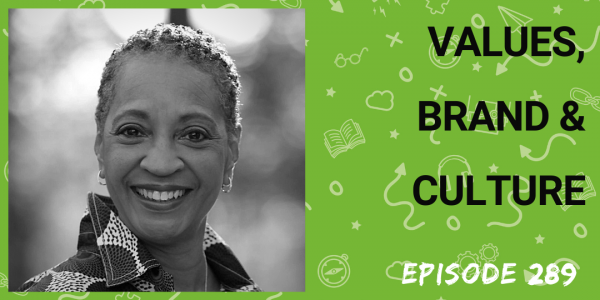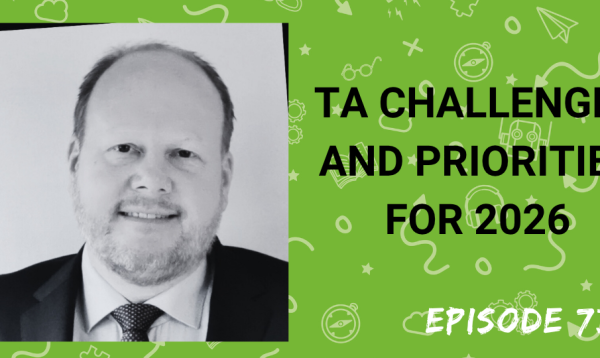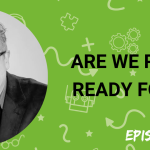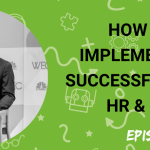In challenging times, it is essential that talent acquisition leaders fully understand the interrelation of employer brand, culture, values and how an organisation services its customers. This is a crucial way that talent acquisition and employer branding functions can illustrate how they create value and help achieve the business objectives of their organisation.
My guest this week is Diana George, an expert in helping employers understand the relationship between talent, values, company culture and customer service.
In the interview, we discuss:
• Recruiting to match talent to values
• What is culture
• The Importance of listening
• Relationship between values, culture and customer service
• How COVID-19 is driving change
• Building a culture that is inclusive and diverse
• Areas of focus for the future
Subscribe to this podcast in Apple Podcasts
Transcript:
Matt Alder [00:00:00]:
Support for this podcast is provided by Atrax. Atrax is the total career site system which converts site visitors into high quality job applicants. A fully SaaS system, Atrax is powered by the latest AI to deliver an outstanding and relevant talent experience, personalized employer branding and a strong conversion of candidates into the ATS. To find out more, go to www.attra. that’s www.attrax.co.uk and Attrax is spelled a double T R A X.
Matt Alder [00:01:01]:
Hi everyone, this is Matt Alder. Welcome to episode 289 of the Recruiting Future podcast. In challenging times, it’s essential that talent acquisition leaders fully understand the interrelation of employer brand culture, values and how an organization services its customers. This is a crucial way that talent acquisition and employer branding functions can illustrate how they create value and help achieve the business objectives of their organizations. My guest this week is Diana George, an expert in helping employers understand the relationship between talent values, company culture and customer service. She has some incredible knowledge to share and I know you’re going to enjoy this interview. Hi Diana and welcome to the podcast.
Diana George [00:01:57]:
Thank you so much Matt for having me. I’m very excited and looking forward to engaging with you today.
Matt Alder [00:02:02]:
An absolute pleasure to have you on the show. Could you just introduce yourself and tell us what you do?
Diana George [00:02:08]:
Sure. Well, my name is Diana George and what I really do is I transform employees into valuable resources. Now I do this by teaching companies how to wow, communicate, coach and retain their top talent whose values match their company cult. But on the flip side, I also work with individuals and prepare them for fulfilling career in companies whose culture matches their values. So the key word for me is culture and that match that you have on both ends.
Matt Alder [00:02:37]:
And I want to explore that in detail in a second. But before we do, tell us about your story. How did you get to do what you do right now?
Diana George [00:02:45]:
So my story is a very interesting one. Thank you for asking me. But one of the things that for me, I started out in sales earlier in my career and I work for some major global corporate. One of them was bold speakers and I always, you know, say the name and I always shout them out because it was a wonderful opportunity and wonderful chance for me to get my feet wet and learn a lot. But one of the things that always amazed me was their company culture and what that meant. And so for me, starting out in my career very new and Having something that was so exciting, innovative, where my thought and what I said mattered and was valued, I took that with me throughout my career. So that was just my level of expectation when I went to other places. And then also the human resource department that we had there was so instrumental because they were wonderful in helping us to be better managers and better leaders. And so when I left there, I took everything that I learned and really have been able to utilize it throughout my career. And so somehow or another, I stumbled on HR and wound up there and said, you know what? I enjoy this. I like it, and I was good at it. And one of the things, certainly when you’re in, you know, human resources is you really, really have, have to like and enjoy working with people.
Matt Alder [00:04:01]:
Absolutely. And interestingly, I’m actually wearing Bose headphones at the moment, and I absolutely love that brand. And as we get into the conversation, it’s probably going to be interesting to talk about culture and brand and customer service and how they all tie together. Before we get there, though, tell us a little bit more about what you mean by culture.
Diana George [00:04:19]:
So culture, to me is so important. And I think that it’s important for every company to have a culture. And so this way, when you have this, you attract the people that you want. And so, so a company culture, it’s the beliefs of the company, it’s the values, it’s the priorities, it’s the language, it’s the how they do everything. And so having that and understanding what that is, you’re going to attract people of that that have those same qualities in your company. And it also relates to your customers and how you serve them. So your company culture really dictates everything that you do. And so the one, the thing about company culture is you can have a company culture and you can have it on paper, but it’s not just having it on paper. It’s important that it’s actually practice every day. And people see the values and they see it in. In work each and every day. So if you have on paper one thing, but then what employees observe is totally something different. It’s still not in sync. So it’s not just about having a company culture, it’s about living that culture. And it’s one that’s a positive culture, because we’ve also heard on the flip side about being in places where the culture was toxic, and so you don’t want that as well. So you want to take a look at how that company, how that culture really helps the company to thrive, excel, expand, and also how you Service your customers.
Matt Alder [00:05:36]:
I think that’s a really interesting point because every company, in fact every, every group of humans have a, have a, have a culture of some kind. So what we’re really talking about is building positive cultures that are valuable for the company and most of all, valuable for its employees. How do you advise companies in terms of the best way to do that?
Diana George [00:05:59]:
So it’s interesting that you said that I just recently wrote was an author in a book that just came out, Anatomy of Accomplishment. And my chapter was on a company culture that transforms. And for me, the number one thing that you can do is to listen. And so if you listen to the people around you and really go into conversations, listening and finding out from them what it is that they’re experiencing, you learn so much. And so I always say to people, one of my favorite shows in the past was Undercover Boss, because that show, what it does is it takes bosses that have, you know, now expanded their company and now they’re CEOs and they’re sitting up in these, in these corporate buildings and they forget what it was like when they first started out that company and what they experience on a day to day basis. And so having someone that listens to you is such a valuable thing and you learn so much from those individuals. And so another thing is really setting standards and expectations for your employee participation. And that goes, so that does so much for you, goes to inclusiveness, it goes to everything because you now have everybody who has a voice and you want to hear their voice and hear what they have to say. So listening for me would be the number one key thing that I think any company can do to really expand in their company culture and put something there that’s positive.
Matt Alder [00:07:20]:
We talk about culture fairly often on this podcast and we talk about employer brand a lot on this podcast. One of the things that we very rarely talked about and because it’s very rarely talked about in the industry, which is a, which is a real shame because incredibly important is the relation between a culture of a company and its customer service and its brand customers and the service it gives those customers. Now, I know that’s something that you focus on a lot. Tell us more about that.
Diana George [00:07:50]:
So let me tell you what my philosophy is and what I truly believe. Your company culture will dictate how you treat your employees. And that’s why I say really wowing your employees, because how well you do that, then that employee will then go ahead and wow your customers. And so it goes, comes full circle. And so that company culture and what you’re giving to your employees and instilling to your employees they’re going to go and they’re going to turn around and that’s the same thing that they’re going to give to the customers. And so if it’s not something that’s positive, if it’s not something that is, is is great for morale or for company expansion, then you’re not going to see that company expand as fast as they would like to or do as well as they would like to, because there’s a very essential missing P that’s not being done. And so it really becomes important and it’s once again a full circle effect of how it translates and how it interacts with the customers on a day to day basis.
Matt Alder [00:08:46]:
So 2020 has been a very, very challenging year. How are you seeing the effects of the pandemic in terms of the conversations that you’re having and the customers that you’re dealing with?
Diana George [00:09:01]:
So, Matt, you said it’s, you know, if anyone, I don’t think anybody could have anticipated that when we counted down at the end of 2019 into 2020, that seven months in we’d be experiencing what we’re experiencing. I don’t think anybody in their wildest dreams could have ever thought that this would be where we are right now. And so as a result of this, and as a result of the way that a lot of companies have handled this, a lot of individuals, employees in particular, are they rethinking everything? This pandemic, what it’s done is it’s really allowed people to slow down. I will say that we have the tendency to be on a hamster wheel and we go, go, go. And so we’ve been forced to stop and really take a look at things and really assess our lives and what’s important to us. And I see a lot of people doing that right now. A lot of employees. And so a lot of individuals are also looking at how is my company really handling this whole pandemic. Just like the country, different countries that we’re in right now, they’re looking at their leaders to see how they’re handling it. It’s the same thing within companies. And I think that based away upon the way that it’s handled, will determine if employees feel safe in coming back and returning to work, or if they even decide that they want to continue with that company, or they’re just rethinking in general whether or not the priorities in life and what they want to do and if they’re really doing something that brings them the joy and happiness that they want in their lives. So there’s a lot of different elements of this pandemic and what it’s done in terms of the workforce and going forward and how we take a look at now going back to work.
Matt Alder [00:10:36]:
One of the other things about 2020 is there is now, and quite rightly, a very large focus on diversity and inclusion as far as employers are concerned with people rethinking their strategies and rethinking their approaches. What would your advice be to employers in terms of helping them to build cultures that are. That are inclusive and more diverse?
Diana George [00:10:59]:
So my advice to different companies to make sure that there is inclusion in their company and they’re being very diverse is you really want to take a look totally at the skillset of the person. What are they bringing? What can they add to your company? And diversity is having different people with different belief systems and they come with different ideas. And so having that at your table and it has to start at the top. It just can’t be the important employees. It has to be modeled. And that comes from having people at the table that can have these certain conversations. So we’ve all seen or had the experience of watching a company, a large company brand, make a mistake in their marketing and do something that, you know was way out there. And we’re like wondering, like, who you know, who didn’t tell them that this wasn’t correct to do. And that’s because you don’t have enough diversity that’s inclusive and sitting at the table where decisions are being made. And so you want to have people from all different backgrounds that’s sitting there, because those are the different viewpoints. That’s how you get the best creativity, the best ideas from people. But you also have those different viewpoints that can tell you and be that barometer if you’re going in the right direction or not. And that’s so key. And we need to have more of that across the board and have more individuals sitting at the table that look like everybody. And so it is an inclusive environment. You’re saying, I want everybody to come to the table. I want to hear what everybody has to say. And your company represents that. And I think that’s so key. Invest, investing in things that allow people to learn, develop and grow. So if they’re not to that level, you have things in place so that they can get to that point.
Matt Alder [00:12:38]:
And how does this translate into recruiting? Very often we hear companies talk about culture fit. We hear other companies talk about culture ad. How does this translate into recruiting. How do companies make sure that they are recruiting? Recruiting people who share that, who share their values, but at the same time and making sure they’ve got that diversity of background and diversity of thought.
Diana George [00:13:00]:
I, I think the most important part and thing that you can do when you’re going into the interview process and you’re interviewing candidates, you want to ask a lot of questions that really find out what they’ve done in the past. And I think so often during the interview process, a lot of times I’ve observed this where you have people that do more talking than they do listening. Because once again, I’m going to say this is through the listening that you can tell what that person has done in the past and asking very specific questions about their experiences other places and what have they been able to do and what have they been able to bring to the table? And so I’ve observed on many occasions where you’ll have an individual who is really good at their job and they, they are the number one seller. But in terms of getting along with other people on their team or just in general, they’re not very good at that. And so what that does is it breeds a toxic environment. But a lot of companies will turn their head and overlook that because this is the number one sales. So even though they’re good in one one sense, they’re not good in the other things. And so it really does have other people repel other people that want to be working with this individual. And think about it, if you had really a diverse group where you gave the same autonomy to everybody and worked on everybody being the best, you know, you never know, you might have a lot of the stars that’s in the group that never come out just because of your focus being on this one person and allowing behavior that that’s not really great energy for the group or the team moving forward. So that becomes really key and being able to take a look at that and how do people relate to each other, how do they interact with each other and acknowledging that. And when you see something doing something about it as soon as possible and not letting things go on. And so even when I say doing things about it very, very soon into the process, it doesn’t mean that you’re going to get rid of that person or that that person can’t be there. But when you have the right conversation sometimes, then people know what needs to be or how they can be better suited in a particular role, or how do they engage or get along with individuals. And so I think that so Often in companies we wait till things are a problem to address it. Where if we had taken a look at it earlier, it could have been handled and gone in the direction that we wanted it to go in. So I really encourage, you know, managers and leaders and supervisors and HR professionals to really be on top of things and when you see certain things, don’t let it go on, confront those things earlier on and handle it. Because it could be the outcome that you want if you handle it earlier on.
Matt Alder [00:15:36]:
I think the other thing about this year is we’re all very much living day to day in the moment. There are very high stress levels everywhere and it can be quite difficult sometimes to sort of look out to the future, to look out 6 months, 12 months, 2 years and think about what things might look like and what might happen. What’s your perspective on what we’ll be talking about in terms of culture in 12 months time, for example?
Diana George [00:16:00]:
So I think that in 12 months time, even in terms of culture, it is going to even be more applicable and that the culture of the company allows for people to have. We’ve used this word before in the past, work life balance. But it exemplifies that from the top down. And I think because things have changed so much even in terms of remote work. So, you know, we take a look at before this pandemic, the amount of people that were working from home and now the amount of people working from home. I think a lot of companies have really identified that, wow, we don’t always need to have everybody come in to the building. And I think, in fact, you’re gonna have businesses that start that will be remote from the very beginning. And so with that being said, I think it’s gonna allow for a lot more of that work life integration. And so there’s gonna be more of a balance there for people. And I think that people are gonna go into certain situations and especially in terms of a work culture looking for that. I think that’s one of the main things that we have identified during this pandemic is that, you know, we don’t. Life is short, that, you know, we want to take an opportunity to spend that quality time with the people that are important to us. And I think going forward, people are really going to be looking for opportunities in the workforce, in their career that will allow them to do that.
Matt Alder [00:17:17]:
Final question. Where can people find and connect with you?
Diana George [00:17:21]:
Sure. That’s a. I would love for people connect with me. I love that. I definitely am on social media. LinkedIn is where I spend the majority of my time. Um, so if you’re on LinkedIn, you could definitely go there and you can follow me. I put out content every week as well as well as articles and different things. But you can also reach me on my website, which is www.bygeorgehr.com and that’s by B Y George H R.com and then my recent book that I told you about, Anatomy of Accomplishment, my chapter, I have a download for people and I would love to give that to your audience and your listeners. And it’s seven strategies for a Winning Culture in any organ organization. And that link is bitly. That’s bit ly. Wow. And that’s all capital. Wow. Employees.
Matt Alder [00:18:13]:
And I’ll make sure we also have that link in the show notes. Diana, thank you very much for talking to me.
Diana George [00:18:18]:
Thank you so much, Matt, thank you so much for having me on the show. And just keep on doing what you’re doing is so needed this. We have to have the regular conversations that we need to have to be able to have the results that we want want. Thank you.
Matt Alder [00:18:31]:
My thanks to Diana George. You can subscribe to this podcast in Apple Podcasts, on Spotify or via your podcasting app of choice. Please also follow us on Instagram. You can find the show by searching for recruiting future. You can search through all the past episodes@www.recruitingfuture.com on that site. You can also subscribe to the mailing list to get the inside track about everything that’s coming up on the podcast. Thanks very much for listening. I’ll be back next time and I hope you’ll join me.








